Yunnan coffee: Why does it represent China?
On the afternoon of March 19, President Xi Jinping conducted an inspection and research tour in Lijiang City, Yunnan Province. Strolling along the flagstone path in Lijiang Old Town and taking in the sights, he was enthusiastically greeted by local residents and tourists. “May we invite you for a cup of coffee?” they inquired. Engaging in a cordial conversation, President Xi remarked, “Yunnan coffee represents China.”
The history of coffee cultivation in Yunnan, and indeed in China, began in 1904 when the first coffee seedling was planted in Zhukula, a Yi ethnic village in Pingchuan Town, Binchuan County, Dali Bai Autonomous Prefecture. Commercial cultivation officially started in 1951, with the Luxi Cotton Experiment Station in Dehong initiating the introduction of coffee seedlings. By the end of 2024, Yunnan’s coffee planting area had reached 1.267 million mu (approximately 84,467 hectares), and its output stood at 146,000 tons. Both figures ranked first in China, each accounting for over 98% of the national total.
Today, Yunnan coffee is increasingly winning over palates worldwide, distinguishing itself on the global stage with a unique “Chinese flavor.” This rise is positioning Yunnan as an emerging international specialty coffee producing region. In this issue, we invite you to journey into Yunnan’s vibrant coffee culture and savor its exceptional aroma.
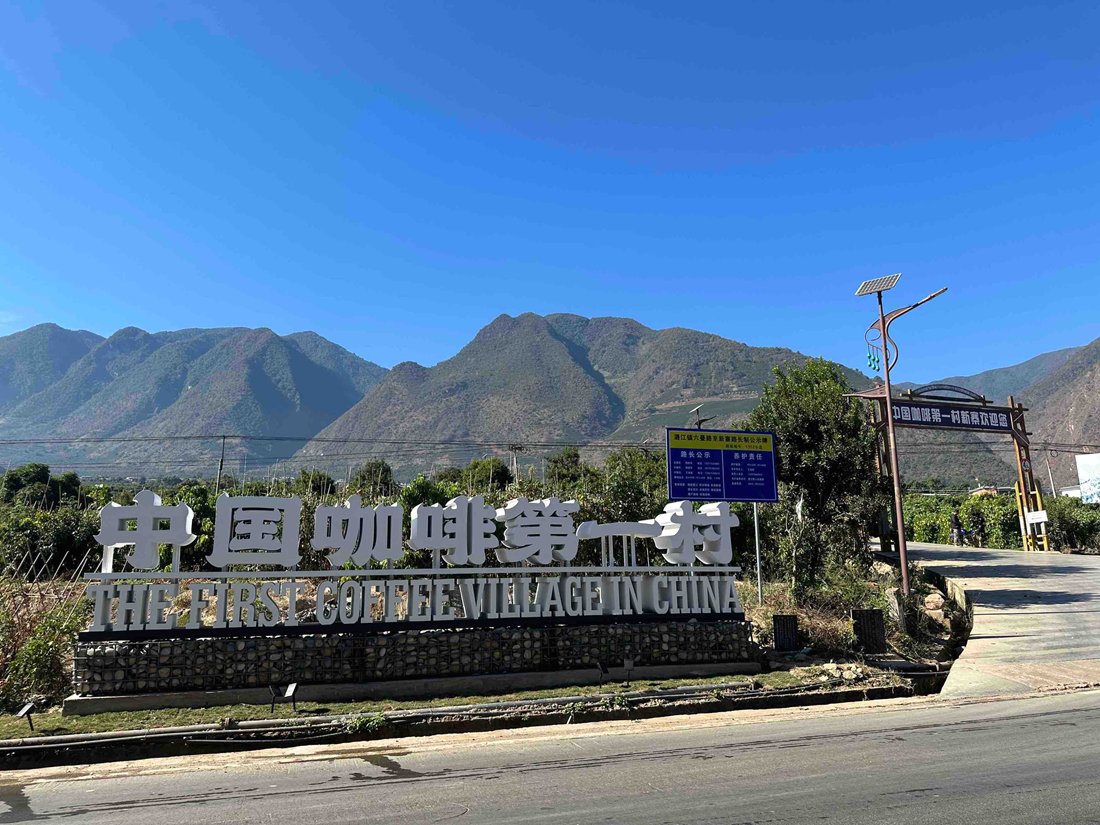
A coffee production area in west Yunnan's Baoshan city
From Zhukula to the world stage
The history of coffee in China dates back over a century. In 1904, a Frenchman planted the first coffee bushes in Zhukula, a Yi ethnic village in Pingchuan Town, Binchuan County, Dali Bai Autonomous Prefecture, Yunnan, marking the beginning of coffee cultivation in the country.
True large-scale cultivation of Yunnan coffee commenced in 1952. That year, experts from the Yunnan Academy of Agricultural Sciences distributed 80kg of coffee seeds to farmers in Lujiangba, Baoshan City, and guided them in extensive planting. As the cultivation area expanded, Baoshan became China’s first region to industrialize coffee cultivation.
The late 1980s marked a significant period for Yunnan coffee. Amidst Nestlé’s expansion into the Chinese and surrounding markets, Pu’er City in Yunnan Province launched a UN Development Programme (UNDP) coffee cooperation project. This initiative brought an influx of foreign capital, advanced technology, equipment, and talent, enabling Yunnan to establish China’s first modern coffee factory. By the early 21st century, international brands like Maxwell House, Kraft, and Starbucks had established operations in Yunnan, leading to the gradual recognition of Yunnan coffee’s quality on a world-class level.
In recent years, the technological capabilities of Yunnan’s coffee industry have rapidly advanced, particularly in deep processing. This includes sophisticated stages like roasting, grinding, extraction and concentration, and freeze-drying. A prime example is the deep processing facility of Yunnan Jinkelong Coffee Industry Co., Ltd. in Simao Industrial Park, Pu’er City, where smart production lines efficiently transform raw coffee beans into freeze-dried products in a mere 30 hours.
“In 2023, we successfully developed and launched additive-free cold brew ready-to-drink coffee beverages, putting us a full year ahead of our peers. The product immediately reached full production capacity upon launch,” said Wu Xiaoxuan, Chairman of Yunnan Cold Brew Technology Co., Ltd.
Cold Brew Technology is committed to producing specialty coffee from Yunnan beans. The company achieves this by assembling a professional technical team, independently researching and designing cold brew coffee production equipment, and tailoring Yunnan cold brew products, all while consistently enhancing coffee quality. “We have obtained over 50 patents, including three invention patents,” explained Wu Xiaoxuan, Chairman of Yunnan Cold Brew Technology Co., Ltd. “These innovations enable us to precisely extract the full flavor and aroma of coffee while also separating undesirable notes. This deep processing has significantly increased our production of specialty coffee. Last year, we also added a new spray drying production line: the initial portion of raw material is used for cold brew freeze-dried coffee, the latter for spray-dried coffee, and the extracted coffee grounds are repurposed as fertilizer, ensuring full utilization of raw materials.”
Yunnan’s primary coffee-producing regions have now expanded to six: Pu’er, Lincang, Baoshan, Dehong, Xishuangbanna, and Nujiang. As of the close of 2024, provincial data showed a coffee planting area of 1.267 million mu (approximately 84,467 hectares) and a production volume of 146,000 tons. The agricultural output value neared 5 billion yuan, representing a 13% year-on-year growth. The average raw bean price was 41 yuan per kilogram.
As the origin of coffee cultivation in China, Yunnan’s geographical environment and climatic conditions are inherently ideal for coffee growth. In particular, its tiered altitudes and diverse mountain and river landscapes provide unique conditions for coffee to thrive and develop a distinct Arabica flavor: “rich but not bitter, aromatic but not intense, with a hint of fruitiness.” As experts have commented, “seeds from the African continent have been nurtured in the subtropical monsoon-soaked soil, catalyzing a distinct Chinese flavor.”
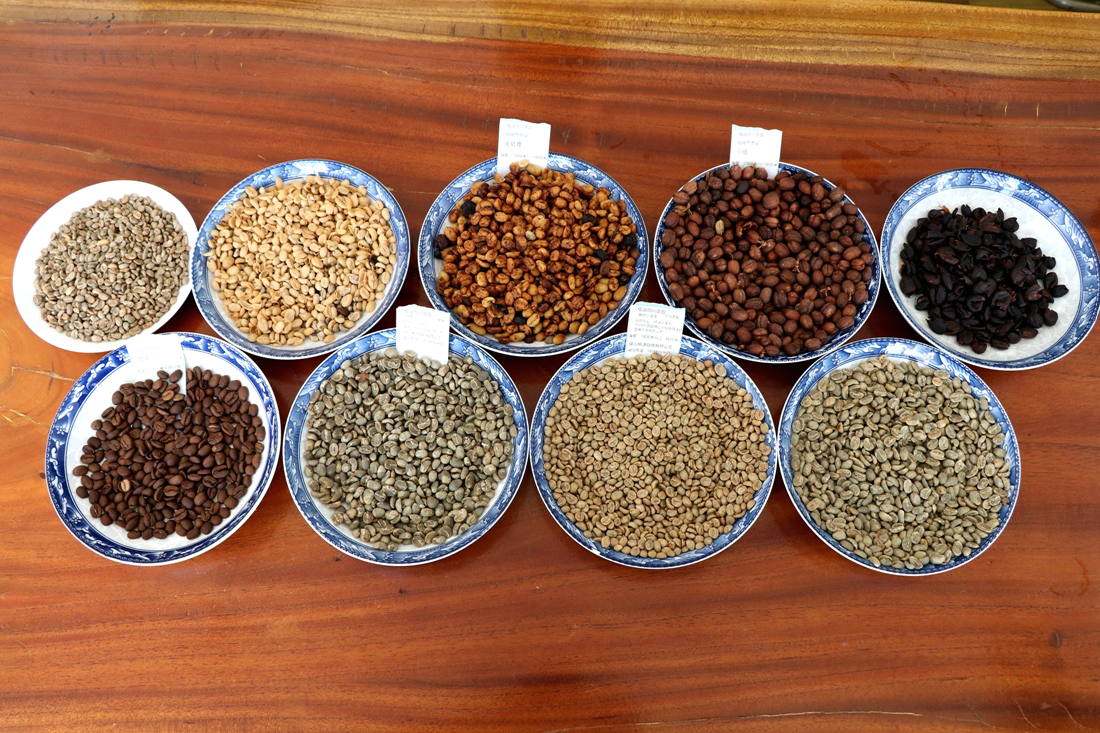
A variety of Yunnan coffee beans
The rise of Yunka series coffee beans
In Xinzai Village, Lujiang Town, Baoshan City, Yunnan Province, amidst hundreds of hectares of coffee plantations, farmer Wang Youchun beams with joy before a patch of vibrant red coffee cherries, celebrating a bountiful harvest. He said, “In the past, growing coffee meant relying on the weather. Now, with the Yunka series, our yield has doubled, and the quality has even made it onto international rankings!”
The brightly red coffee cherries are the culmination of 73 years of dedicated research by the Institute of Tropical and Subtropical Cash Crops at Yunnan Academy of Agricultural Sciences. Since coffee was first introduced to Lujiangba in 1952, the Institute has independently bred and selected the Yunka series of varieties, propelling Yunnan coffee from traditional farming to a technologically empowered industry.
While Catimor (an Arabica hybrid) remains the predominant coffee variety in Yunnan, decades of cultivation have led to challenges such as aging plants and a low ratio of specialty-grade beans. “The more challenging it gets, the more we need scientific researchers to step forward,” asserted Hu Guangfa, Director of the Institute and Chief Expert of the Yunnan Academy of Agricultural Sciences Coffee Innovation Team. In recent years, the Institute has leveraged Yunnan’s rich coffee germplasm resources to continually optimize breeding techniques. They have accelerated research into the agronomic traits and genetic characteristics of diverse coffee types, including wild relatives, native species, and cultivated varieties. This extensive work has culminated in the establishment of a regionalized trial and demonstration breeding system for Yunnan coffee. The Institute has not only effectively rejuvenated the Catimor variety but also addressed a series of key technological hurdles in the coffee industry. Their efforts have resulted in the independent breeding of 22 new coffee varieties, many of which yield over 4 kilograms of fresh cherries per plant.
“Yunnan stands as one of the few regions in the country ideal for cultivating high-quality coffee,” Yang Zhu, Chairman of Baoshan Zhongka Food Co., Ltd., highlighted Baoshan’s unique subtropical dry and hot climate, which sets it apart from other Yunnan coffee-producing areas like Pu’er, Dehong, and Lincang. This distinct environment yields coffee beans that are rich but not bitter, aromatic but not strong, and possess a delicate fruity acidity, making them exceptionally distinctive. Yang emphasized that innovation has been their key advantage. Through close collaboration with the Institute, they successfully cultivated “Yunka No. 1,” Yunnan’s first independently developed coffee variety. For processing, the company further partnered with a leading optical enterprise to develop and implement X-ray bean sorting, significantly enhancing the precision of coffee bean selection.
In 2025, “Yunka No. 2” was distinguished by the Yunnan Academy of Agricultural Sciences as one of its top ten recommended new varieties. This exceptional cultivar not only reaches peak production in a mere three years but also boasts a rich aroma, bright fruity acidity, full body, and balanced taste in cup profiles. Crucially, its impressive yield of 167.2 kilograms of dry beans per mu has effectively overcome the historic challenge of low yields for Yunnan coffee. Joining it, “Yunka No. 3” and “Yunka No. 4” have also debuted, promising distinct floral notes and tropical fruit flavors, respectively.
Technological advancements extend beyond just new varieties. A prime example is the “Sinkhole Washed Sarchimor” coffee beans from the coffee base next to the Sinkhole in Cangyuan Wa Autonomous County, Lincang City, which secured first place in the China regional competition of the Global Raw Coffee Bean Contest. Jin Tao, head of Qiupo Manor, explained, “We have introduced microbial fermentation and targeted roasting techniques throughout the entire process from planting to processing, effectively ‘locking’ the floral and fruity aromas into the beans.”
Currently, over 60% of Yunnan’s coffee plantations utilize technologies such as water and fertilizer integration and green pest control. The average yield of ordinary demonstration farms reaches 139.06 kilograms per mu, which is 2.38 times the global average yield.
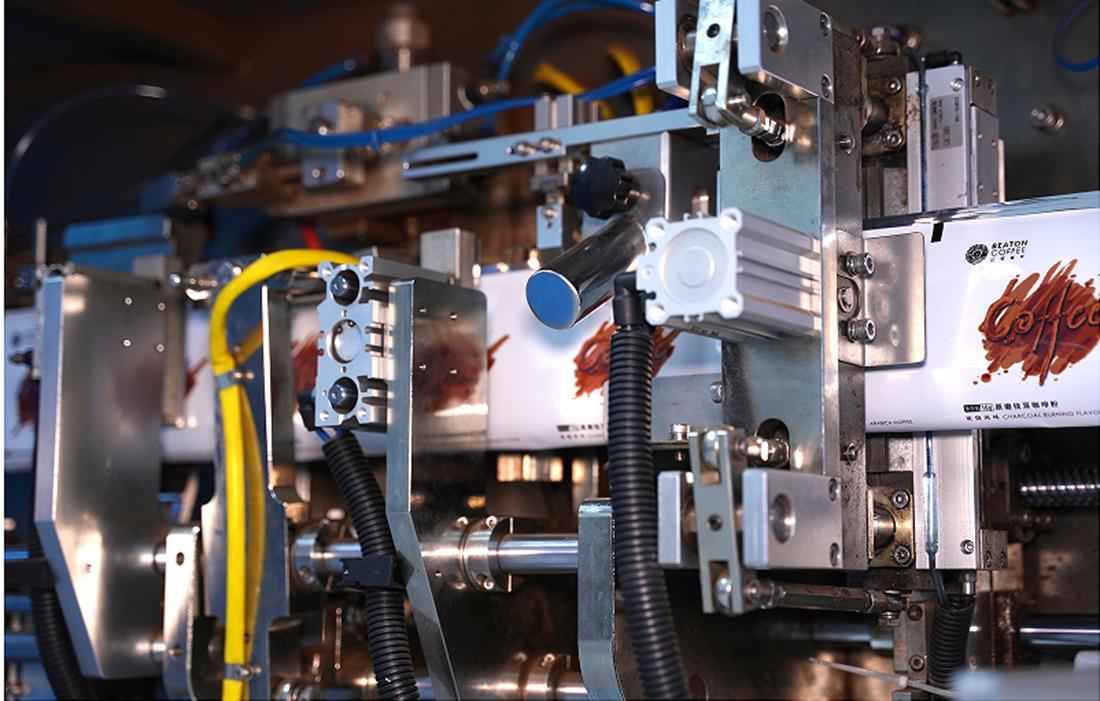
A coffee production line in Yunnan
Unlocking coffee’s distinct flavors
At the coffee factory within the Kunming Economic and Technological Development Zone (Kunming ETDZ), the constant hum of roasting equipment fills the air. Here, bags of coffee beans and finished coffee products, imbued with the unique essence of Yunnan’s sun and soil, are prepared for shipment to global destinations.
“Click on No.8 link for pour-over coffee, it’s our signature coffee bean, with notes of orange blossom, oolong tea, and caramel; or No.9 link, a bean grown in Baoshan, Yunnan, at an altitude of 1500 meters...” The Time Coffee e-commerce live streaming room in Kunming ETDZ buzzed with activity. Duan Jiexing, General Manager of Yunnan Time Agricultural Development Co., Ltd., said, “Last year, the company’s business volume at the Kunming factory reached nearly 5,000 tons, with sales revenue of approximately 180 million yuan.”
The Kunming ETDZ coffee processing park represents a comprehensive industrial hub. It encompasses raw coffee bean trade, roasting, cold brew extraction, and instant product development. Beyond processing, it also integrates coffee shop operations and coffee-tourism development, fostering a concentrated growth trend in the industry. Liu Yingzhen, General Manager of the Internet Marketing Center at Yunnan Zhongfei Food Factory, explained, “In the past, our parents’ generation planted crops based on experience, but now it’s almost entirely scientific cultivation, with yields and quality far surpassing before.”
Yunnan has introduced comprehensive policies to guide its coffee industry, covering varietal renewal, fresh fruit processing, deep processing, estate development, and brand building. The Yunnan Provincial Department of Agriculture and Rural Affairs has planned 1.05 million mu (approximately 70,000 hectares) of suitable areas for specialty coffee, recommending excellent varieties such as Geisha, Typica, Catuai, and DTARI to facilitate continuous varietal improvement. Having completed its mission in the previous stage, what new mission awaits Yunnan coffee?
At the origin, Yunnan coffee farmers are redefining coffee bean processing. Beyond classic washed, natural, and honey methods, they are now applying novel approaches.
Drawing inspiration from Pu’er tea’s wet-piling fermentation, anaerobic fermentation, fruit fermentation, and other ingenious methods, they imbue coffee beans with a unique Yunnan flavor.
Liu Yingzhen’s business travel has increased, as she and her colleagues frequently visit other provinces for offline store research. “While the freshly ground coffee market is developing rapidly, the instant coffee market is also substantial,” she noted. “The milk latte and durian freeze-dried latte we developed after our research are star products in the company’s e-commerce sector, boasting a high repurchase rate.” She added, “We are now also collaborating with a laboratory at Yunnan Agricultural University, combining Yunnan coffee with Yunnan flowers to develop new flavors.”

A coffee-flavored Yunnan dish
Yunnan coffee’s outward bound
As dawn broke over the mountains of Pu’er, Yunnan, coffee farmers were already gathering the day’s first ripe berries into their bamboo baskets. Meanwhile, 2,680 kilometers distant, the roasting factory at the coffee industrial park in Kunshan, Jiangsu, was already in full operation. When asked about the precise volume of Yunnan coffee processed in Kunshan, the external communications representative for the Starbucks’ China Coffee Innovation Park could not provide an immediate figure. However, she confirmed that every cup of Starbucks’ classic espresso contains Yunnan coffee beans.
In 2012, Starbucks established its first Asia-Pacific Farmer Support Center in Pu’er, pioneering a “premium price for premium quality” approach that led to coffee bean purchase prices 20-30% higher than the market average. Eleven years later, the Starbucks’ China Coffee Innovation Park, a 1.5 billion RMB investment, opened in Kunshan. This development made China the first Starbucks global market to complete the entire “bean-to-cup” vertical supply chain. Here, high-quality Arabica coffee beans from over 30 global origins, including Yunnan, are freshly roasted and delivered to Chinese consumers with maximum efficiency.
With the establishment of the Starbucks industrial park in Kunshan, the proportion of Yunnan coffee in the core espresso blend has notably increased. At the 6th Starbucks Yunnan Green Coffee Excellent Supplier Conference in October 2024, Liu Wenjuan, Starbucks Global Executive Vice President and CEO of Starbucks China, stated, “We have finally incorporated high-quality Yunnan coffee beans into every cup of Starbucks classic espresso sold in mainland China. Every store in the mainland will also sell Yunnan single-origin coffee beans.” She emphasized that “Yunnan in every cup” has indeed become a reality.
For coffee enterprises in Kunshan, Yunnan coffee beans are the preferred choice. According to Xiao Guoqiu of Kunshan Xuanrui Coffee Co., Ltd., “40-50% of our green bean raw material comes from Yunnan, primarily Arabica and Catimor. Yunnan coffee’s mellow flavor is highly favored by the market.” Inspired by the maturing industrial ecosystem within the development zone where he previously worked, Xiao founded Kunshan Xuanrui Coffee Co., Ltd. in 2023. This local company specializes in OEM coffee roasting, drip bag coffee production, roasting R&D, and barista training, serving clients such as chain coffee shops, hotels, and e-commerce platforms. He added, “We regularly send our team to visit our cooperative Yunnan Pu’er coffee cultivation bases to ensure our product lines can be adjusted to meet market demand.”
More stories of collaboration are unfolding in this region. Luckin Coffee has established a coffee cherry processing plant in Baoshan, achieving full chain control “from bean to cup.” Yizheng Coffee combines cultivation techniques such as full red cherry picking, washed, and sun-dried processing from Yunnan with their enterprise’s roasting and quality control technologies, promoting the premiumization of domestic coffee. Kele Coffee infuses Kunqu Opera elements into Yunnan coffee beans, launching “Kunqu Crossover Coffee” and “Kunshan Village Coffee + Yunnan Coffee,” enhancing the added value and brand influence of Yunnan coffee. The rich aroma from Yunnan’s mountain valleys also spreads from here to the rest of the world.
Kunming Customs statistics reveal that in 2024, Yunnan’s coffee exports reached 32,500 tons, marking a significant year-on-year increase of 358%. These exports primarily went to 29 countries and regions, including the Netherlands, Germany, the United States, and Vietnam.
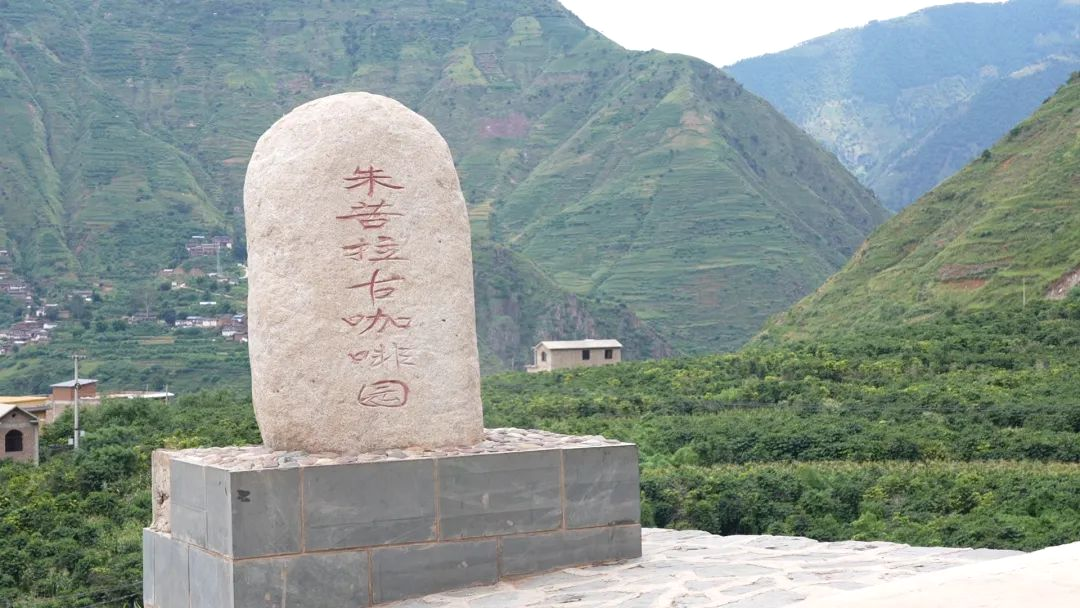
Zhukula, a Yi ethnic village in west Yunnan, marks the beginning of coffee cultivation in China.
Yunnan’s charm through coffee tourism
Each year, from October through March, Pu’er City — celebrated as “China’s Coffee Capital” — is enveloped in the rich aroma of coffee. The deep integration of coffee and tourism allows visitors to experience a unique “coffee tourism” journey, engaging with the entire chain from planting and harvesting to tasting. This unfolds across various new consumption and experience settings, including coffee estates, coffee-themed streets, post offices, trendy cafes, coffee parks, and cultural markets.
Liushun Town, located in Pu’er City’s Simao District, is blessed with a mild climate and abundant vegetation, making it a natural sanctuary for wild Asian elephants. Nestled within Nanbanghe Village in Liushun Town, the Elephant Coffee Manor emerges amidst rolling hills and lush greenery. This remarkable estate, which forms a giant “heart” shape when viewed from above, offers visitors the extraordinary experience of sipping coffee while observing wild Asian elephant herds foraging and dwelling in the distant mountain forests.
“When you’re holding a cup of coffee and you see wild elephants leisurely foraging on the opposite hillside and in the bushes, that scene is truly spectacular and unforgettable,” said Huang Daxiang, a coffee enthusiast from Kunming.
At Xiaowazi Coffee Manor, located in Nandaohe Village, Simao District, the intoxicating aroma of coffee instantly encourages visitors to linger. Following extensive upgrades and renovations, made possible by special local government funding, the estate proudly reopened on January 21st this year. New facilities, including a boutique coffee experience hall, a coffee roasting classroom, and a research and study center, are now complete within the estate. While enjoying delicious coffee, visitors can also delve deep into the entire “seed-to-cup” process of Pu’er coffee.
Liao Hongwen, manager of Xiaowazi Coffee Manor, explained that the manor is not only a paradise for coffee bushes but also a vibrant habitat for birds, reptiles, insects, and ants. Every June and July, it transforms into an ideal breeding ground for fireflies. This unique setting allows visitors to observe these creatures up close and truly experience the magical charm of nature.
Coffee shops on the scenic shores of Dali’s Erhai Lake are a magnet for tourists, drawing crowds for their offerings and as ideal photo backdrops.
Step into any lake-view seat, and a shimmering blue expanse immediately greets you. Before the morning mist lifts, the scene outside resembles a floating palace, its floor-to-ceiling windows artfully framing Cangshan Mountain’s clouds and the glistening water into a living masterpiece. Reclining in a light wood wicker chair, a cup of aromatic pour-over coffee in hand, as the lake breeze gently flutters the plain white curtains, one might briefly feel as if sailing on the morning light. As evening descends, silhouettes holding coffee cups are gilded with gold, making even unedited photos appear professionally filtered. When clouds embrace the setting sun as it dips into Cangshan Mountain’s folds, the panoramic window becomes a painter’s palette, and the very aroma of coffee in the air seems infused with the sweetness of twilight.
At the foot of Yulong Snow Mountain, north of Lijiang city, the fairy-tale-like Yuhu Village also boasts coffee shops worth visiting.
The moment you push open the door, wind chimes gently sway as the enveloping scent of cedarwood mingles with the caramel notes of Yunnan Arabica coffee. Wooden tables and chairs, bathed in warm lighting, create a truly cozy and inviting atmosphere. This coffee shop beautifully captures the distinct moods of each day: the tranquility of the blue hour, the brilliance of dawn, and the tender glow of twilight, each unfolding like a cinematic moment. As the barista’s latte art foam melts into the shimmering light, you will understand why it is said that what is offered here is not merely coffee, but the authentic romance of Lijiang locals.
Nestled at the foot of the snow mountain in Lijiang is a unique coffee shop, affectionately dubbed by countless netizens as the real-life counterpart to the store in the movie Moments We Shared. As the sun rises, holding a cup of coffee and watching the golden light flow between the mountains brings a boundless sense of warmth and hope. Yet, it is only upon arriving here that you truly understand: the most captivating sight is not merely the golden glow on the mountains themselves, but the vibrant human spirit stirring within the sky’s luminous embrace.
Yunnan’s beauty is not confined to Dali and Lijiang; in Kunming, along Dianchi Lake, numerous coffee shops offer serene vantage points where you can enjoy the “sea” (lake) and even feed seagulls. Simply settling in and absorbing the expansive views is enough to fill your heart with boundless joy. As evening approaches, Kunming’s Haiyan Village unveils its breathtaking “Orange Sea” as if on cue — the vibrant sunset reflecting on the water. Here, amidst the golden silhouettes, you can capture a stunning “Mirror of the Sky” photograph. In this perfect moment, the aroma of the coffee in your hand seems to deepen, enriching the entire scene.
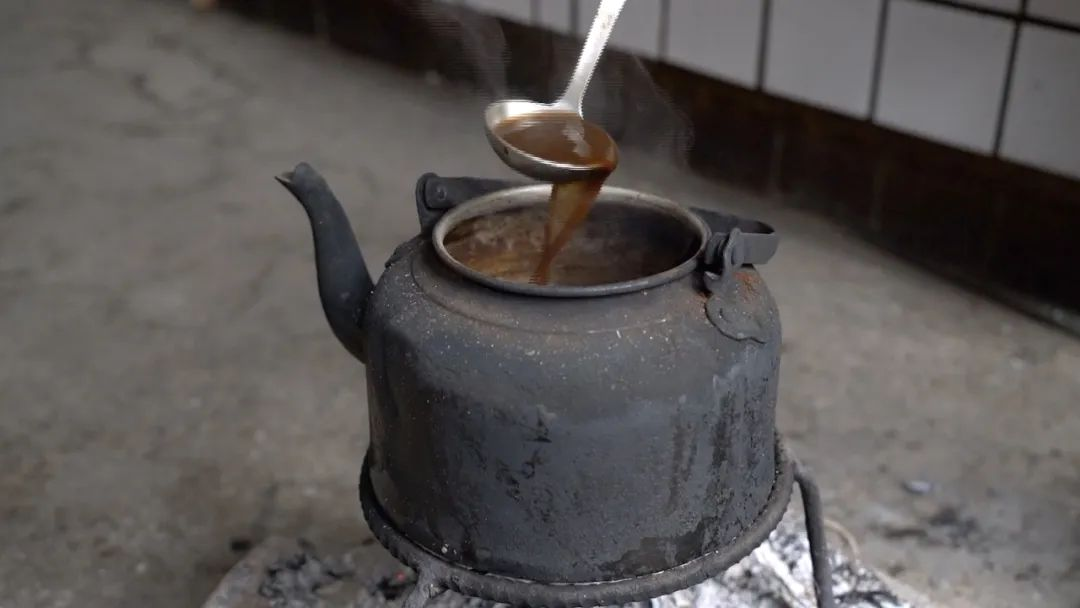
The traditional way of coffee making in Yunnan
Another way to enjoy coffee
In Dali’s Zhukula Village, the Yi ethnic villagers drink coffee with a robust and uninhibited spirit.
The process begins by pounding dried coffee cherries in a stone mortar. A bamboo winnowing basket then separates the husks. Next, the coffee beans are poured into a large clay pot on a traditional stove, where a few spoons of salt are added before they are stir-roasted until cooked. Finally, they are ground in a stone mill to become coffee powder.
In every village household, the blackened aluminum pot is the indispensable coffee maker. Forget dark roast or light roast, drip brew or pour-over; here, stripped of its Western veneer, the coffee offers a pure, unadulterated experience: raw, earthy, bittersweet, and rich.
In Lujiangba, Baoshan, a region with a long history of coffee cultivation, local Dai ethnic villagers have also developed their unique “Ancient Method Coffee.”
Soulful ingredients are added to the boiling coffee: brown sugar and crushed walnuts. The aroma of coffee blends with the sweetness of brown sugar and the fragrance of walnuts, creating a rich taste that leaves a lasting impression.
After finishing a cup of authentic Ancient Method Coffee, one can also enjoy a special dish: coffee-boiled eggs. Coffee is heated in an iron pot, fresh eggs are added and cooked until soft-boiled, then scooped into a bowl with brown sugar and crushed walnuts. Coffee-boiled eggs not only have the sweet tenderness of brown sugar eggs but also the bitterness and unique aroma of coffee.
Just when you thought coffee could only be a beverage, Dehong presents a dish called “Coffee Sapie.”
Fresh beef and chives are minced together, then seasoned with salt, cilantro, bird’s eye chili, and other spices, and thoroughly mixed. Then, the filtered coffee is introduced; the rich, aromatic coffee liquid is poured into this mixture until fully incorporated. This unique concoction serves as a dipping sauce for rice noodles, oil-drizzled dried beef strips, grilled beef liver, and raw cabbage. With each bite, the palate encounters a symphony of sour, sweet, bitter, and spicy notes, creating a truly complex and multi-layered experience.
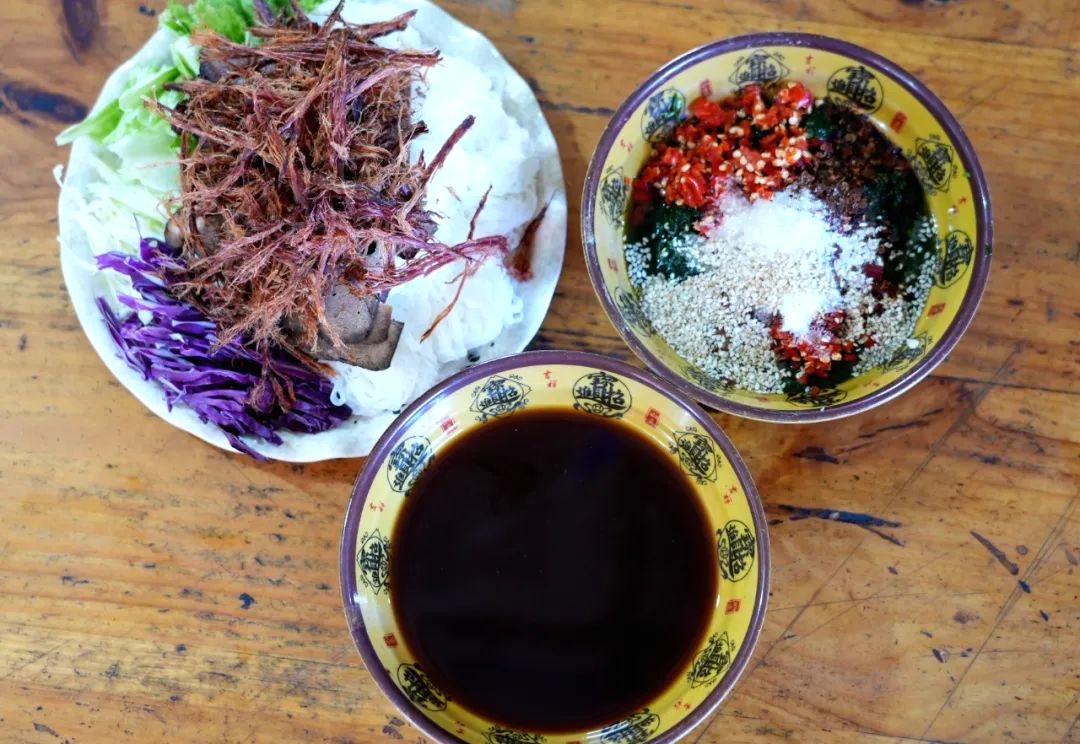
A coffee-flavored Yunnan dish popular among Dai people
Read More:
Learning about Yunnan coffee
Yunnan’s unique mountainous terrain allows one to experience “four seasons on a single mountain,” with dramatic weather shifts occurring over just a few miles. This distinct climate has profoundly influenced the differentiated development of Yunnan coffee. Consequently, the vast climatic differences across its coffee-growing regions mean that even the same coffee variety yields unique flavors when cultivated on different mountain ranges.
Characteristic coffee flavors from Yunnan’ main producing Areas
Pu’er: Nutty, Sweet, Chocolatey
Baoshan: Pronounced Citrus, Sweet, Berry, Distinct Floral, Stone Fruit
Dehong: Citrus, Nutty, Sweet
Lincang: Citrus, Sweet, Nutty, Pronounced Floral
Xishuangbanna: Nutty, Citrus, Sweet
Characteristic coffee flavors of Yunnan’s main varieties
Yunka No. 1: Balanced floral and citrus notes with soft acidity.
Yunka No. 2: Distinct berry flavor, juicy and smooth, with a rich, full-bodied profile.
Yunka No. 3: Juicy and smooth, offering a balanced sweet and sour taste and a long-lasting aftertaste.
Yunka No. 4: Featuring berry and tropical fruit flavors, high body, and a rounded mouthfeel.
To determine its quality, coffee undergoes a unique “test” known as cupping. This assessment scrutinizes various characteristics, including the coffee’s aroma, distinct flavors, acidity, sweetness, bitterness, and overall mouthfeel. In the specialty coffee industry, an 80-point cupping score serves as the entry threshold. It is noteworthy that many Yunnan coffees proudly meet, and often exceed, this benchmark.
Text by our staff correspondents
Translated by YNTA
Proofreading by Zu Hongbing